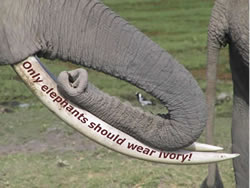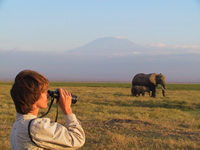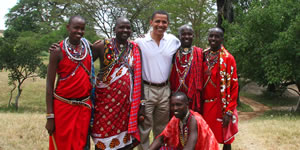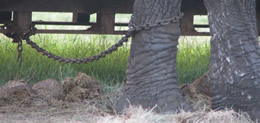Elephants need YOUR help. Each one of us can make a difference, whether we're talking about wild elephants living where they belong or wild elephants in captivity. Below you'll find some suggestions and ideas - your involvement is vital.
1. Use Your Talents and Skills to Spread the Word!
 Do you like to write? You can contribute towards a kinder future for elephants by writing letters, opinion pieces or Op-Eds to your local newspaper, by getting a journalist interested in the plight of the elephants or your near by captive elephant(s), by blogging, by signing a petition or by communicating with decisionmakers directly. Still at school? Write a report, an essay or a poem about elephants, and share it when your teacher has seen it.
Do you like to write? You can contribute towards a kinder future for elephants by writing letters, opinion pieces or Op-Eds to your local newspaper, by getting a journalist interested in the plight of the elephants or your near by captive elephant(s), by blogging, by signing a petition or by communicating with decisionmakers directly. Still at school? Write a report, an essay or a poem about elephants, and share it when your teacher has seen it.
Perhaps you like to shoot a video clip and publish your public service announcement (PSA) or message via YouTube, Facebook, Vimeo or other social networks. Do a search to find out how to create an efficient PSA. Create a poster, artwork or an animation - a good one could go viral really fast. Please write to us about it - we may post your work on ElephantVoices on Facebook. You'll find lots of important issues to cover below. And if you need sound science-based arguments - look around here on ElephantVoices.
2. Join our Community, and get Your Friends to Join as well!
You will do elephants and ElephantVoices a big favour if you share your interest in elephants and our work with your friends, whether in person or via social networks. Visit us on Facebook, Instagram, Twitter, and invite your friends to do the same! You are of course very welcome to refer to or link ElephantVoices content.
It is a big challenge to attract and convince those who may not know enough to realize that most elephants in captivity are living a life in misery - and that elephants in the wild need protection - we need your help to change our collective conscience! You'll find most arguments related to Elephants in Captivity here on ElephantVoices and via The Elephant Charter - thank you for caring!
3. Help us Stop the Ivory Trade and Poaching - never Buy or Sell Ivory!
Elephants are in serious trouble, and for many populations time is running out. Tens of thousands of elephants are being killed annually to supply a booming illegal trade in ivory, partly due to previous misguided decisions by CITES. If people stopped buying the killing would stop. Express your view to others that only elephants should wear ivory and that there should be no trade in it, anywhere.  This is even more important if you have influential friends or contacts in relevant decision-making positions! Feel free to use the animated message to the right on your own blog, just "Save Image As...".
This is even more important if you have influential friends or contacts in relevant decision-making positions! Feel free to use the animated message to the right on your own blog, just "Save Image As...".
Most nations (169) are signatories to the Convention on International Trade in Endangered Species, CITES, and every two and a half years when the Convention meets, the topic of whether to allow the sale of elephant products (mainly ivory) seem to come up for discussion. Visit Elephants killed for their ivory if you want to know more. The last CITES meeting of the Parties, CoP17, took place in Johannesburg in September/October 2016. Get in touch with your country’s representatives at CITES and tell them that a domestic trade ban is the only way forward - you'll find contact information for CoP17 participants (provisional list) here. You may find other ideas about how to help under point 1 above.
4. Support Elephant Conservation and Anti-poaching - it is Much Needed!
 Another way to help elephants is to give your support to those institutions, organisations, projects and individuals who work to better understand, conserve and protect elephants, whether this be through applied conservation, education, advocacy or basic research. The Internet is obviously a good source of information on the types of projects that are being undertaken across Africa and Asia.
Another way to help elephants is to give your support to those institutions, organisations, projects and individuals who work to better understand, conserve and protect elephants, whether this be through applied conservation, education, advocacy or basic research. The Internet is obviously a good source of information on the types of projects that are being undertaken across Africa and Asia.
You'll be able to donate online to most organisations, including ElephantVoices. Any amount helps - and is highly appreciated. If everyone who cared gave just $10 a month to their favourite elephant charity, think what a huge difference it could make.
5. Be an Eco-Tourist
 Finding ways for people and free-ranging elephants to live in harmony is a major challenge. Positive attitudes toward the presence of elephants is more likely where local communities benefit through tourism. This is partly what ElephantVoices' initiative Elephant Partners in the Serengeti-Mara ecosystem is about.
Finding ways for people and free-ranging elephants to live in harmony is a major challenge. Positive attitudes toward the presence of elephants is more likely where local communities benefit through tourism. This is partly what ElephantVoices' initiative Elephant Partners in the Serengeti-Mara ecosystem is about.
In this context eco-tourism based on proper respect for nature and local culture can be an important contributor toward the conservation of elephants and other wildlife, and ecosystems as a whole. Tourism is furthermore vital to provide the revenue needed by parks, reserves and conservancies to conserve and protect.
6. Don't attend Circuses that Exhibit Elephants (or other animals, for that matter)
 You can make life better for abused individuals by boycotting circuses with elephants, and by appealing to others to do the same. The nature of circuses creates an unbearable setting for animals in general and for elephants in particular.
You can make life better for abused individuals by boycotting circuses with elephants, and by appealing to others to do the same. The nature of circuses creates an unbearable setting for animals in general and for elephants in particular.
You may want to visit ElephantVoices' section about Elephants in Captivity, or directly go to Elephants in circuses.
7. Don't go on an Elephant-back Safari
Elephant-back safaris often rely on capturing elephants from the wild which involves the brutal abduction of a juvenile or calf from its family. Training elephants to do what its handlers want, when they want it - means the use of a sharp bullhook and other instruments inflicting pain as well as long periods of chaining.
By riding on an elephants back you are supporting this trade. Some may believe that elephants available for rides enjoy what they are doing, but in reality this is a brutal business based on unacceptable methods and abuse. Read more here.
8. Support Efforts that will Improve the Lives of Elephants in Zoos
 The vast majority of captive elephants experience circumstances far below what they need to live a decent life. Fortunately, more and more people are aware that this is so, and are challenging the status quo. As a result, we are beginning to feel the "winds of change". Some debates are so heated that the elephants may feel the rumblings, too!
The vast majority of captive elephants experience circumstances far below what they need to live a decent life. Fortunately, more and more people are aware that this is so, and are challenging the status quo. As a result, we are beginning to feel the "winds of change". Some debates are so heated that the elephants may feel the rumblings, too!
The zoo industry is questioning age-old practices and exploring new ways to allow elephants to be elephants. Zoos have a very long way to go, however, and you can make a difference by encouraging them not to keep elephants where cold winters necessitate that they be indoors, where there is insufficient space to allow elephants to live in social groups, and where the management style relies on bullhooks and chaining. We appreciate those zoos that support real conservation initiatives in elephant range states, but breeding elephants in captivity has nothing to do with conservation. It should at the same time be obvious that we cannot, in the name of undocumented educational value, let elephants suffer.
9. Ensure that your Local Zoo does not Import Elephants from the Wild
Because zoos don't have the space to allow elephants the lifestyle they are adapted for, they neither reproduce nor survive well in captivity. It is a disturbing fact that the list of dead zoo elephants gets longer by the day. The result is that the number of elephants in captivity in the United States and in Europe is in decline. As a consequence there is growing incentive for zoos to try to acquire more elephants from Africa or Asia.
You can help to ensure that elephants are not taken from the wild by making sure that your local zoo does not obtain its elephants from any of the elephant range states. Instead demand that your zoo phase out its elephant exhibit or build a sanctuary sized enclosure where elephants basic interests can be met. You may want to read Sanctuary for Elephants - Overall Principles, a document launched in December 2011.
